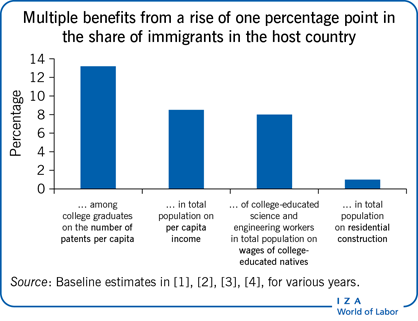Elevator pitch
Migration policies need to consider how immigration affects investment behavior and productivity, and how these effects vary with the type of migration. College-educated immigrants may do more to stimulate foreign direct investment and research and development than low-skilled immigrants, and productivity effects would be expected to be highest for immigrants in scientific and engineering fields. By raising the demand for housing, immigration also spurs residential investment. However, residential investment is unlikely to expand enough to prevent housing costs from rising, which has important distributional implications.

Key findings
Pros
High-skilled immigration attracts foreign direct investment.
Immigrants can help multinational firms find investment opportunities abroad.
Increasing the share of high-skilled immigrants has sizable income effects that can be attributed to productivity gains.
Foreign-born scientists and engineers particularly contribute to innovation and productivity growth.
Cons
Immigration is less likely to promote productivity growth when immigrants are low-skilled.
Residential investment triggered by higher immigration is insufficient to prevent housing costs from rising.
Temporary migrants put most of their savings into remittances, which do not boost investment in the host country.
Attracting high-skilled immigrants may lead to net brain drain for developing countries even though migration possibilities can spur educational investments.